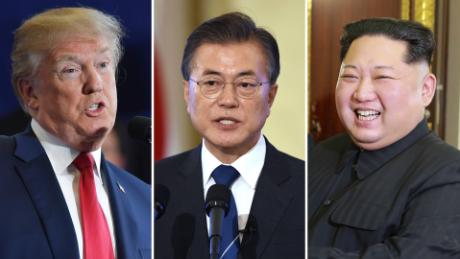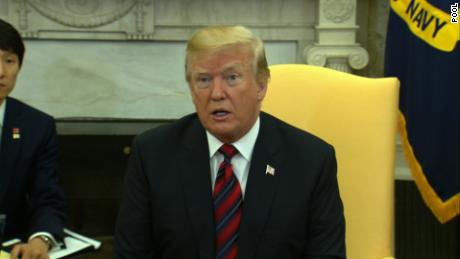May 23.2018
CNN 슈테펀 콜린즈 기사는 뒤죽박죽이다. 논조도 동의하기 힘들다. 더군다나 우리들 정치적 목표점과도 거리가 멀다.
(아래 내용은 콜린즈 기사 요약이 아니고 내 주관적인 견해이다)
1.슈테펀 콜린즈 분석이 별 설득력이 없는 이유들
만약 북미회담이 지리멸렬해지면 가장 손해보는 사람들은 트럼프와 김정은이다. 트럼프는 지금 북한카드를 성공적으로 수확해서 11월 중간 선거에서 민주당이건 공화당이건 반트럼프파들의 콧대를 꺾어 놓고 싶어한다.
실제 북미회담 개최로 트럼프 지지율이 올라갔다. 미국 민주당과 주류 언론도 "내로남불" 이중잣대다. 트럼프가 북핵 과실을 따먹고 있는 사실이 배가 아픈 것이다.
지금 군수 자본을 대변하는 John Bolton 과 손잡고 "거 봐라 북한 못믿어"를 지속적으로 전파하는 세력들이 있다.
2. 북핵 문제의 위상과 그 특성에 대한 미국 외교가의 판단
- 미국 외교가 싱크탱크에서 나오는 중요한 이야기들 중에 하나가 "이라크, 아프가니스탄, 이란 문제보다 오히려 북한 문제가 더 풀기 쉽다. 미국이 노력하면 외교적 결실을 거둘 수 있다" 라는 설이다.
트럼프는 이해관계 플러스 마이너스를 따지는데 있어서 다른 미국 정치가들보다 빠르게 대응한다. 트럼프는 "아 이거 비지니스 아이템 되는 김정은 놓치고 싶지 않을 것이다" 지난 2년간 트럼프 발언 내용들에서 내가 느낀 소감이다.
3. 김정은 국무위원장 역시 북미수교를 목표로 하고 있고, 트럼프보다 훨씬 더 명료한 목표들을 갖고 나왔다. 지금까지 이미 국제정치 무대에서 스포트 라이트를 받았다. 스타는 후속타를 내놓아야 한다. 김정은이 psy 싸이도 아닌 바에 "나는 정은 스타일" 한곡 내놓고 국제 무대에서 퇴장하지 않을 것이다.
김정은 국무위원장은 일대일로 미국 대통령과 회담하는 것 자체가 1950년 한국전쟁 상황과 유사한 무게감이 있다.
북한 내치에서 가장 중요한 북한 주민들의 삶의 질 향상, 이를 위한 경제발전, 과학기술의 비약적 발전을 성취하기 위해서, 하루 속히 국제 경제제재들로부터 해방 되어야 한다.
북미회담을 성공해야만 하는 절실함이 북한에도 있다. 따라서 겉으로는 외교 신경전 난타전을 벌이지만, 이번 북미회담은 구체적인 협상 단계들을 밟을 것이다.
CNN 슈테펀 콜린즈 기사는 관성적인 분석이다.

Trump's North Korea summit was a history-making gamble. Now it may not happen.
Analysis by Stephen Collinson, CNN
Updated 7:05 AM ET, Wed May 23, 2018CNN)President Donald Trump's spur-of-the-moment decision to agree to a face-to-face meeting with North Korea leader Kim Jong Un represented an unprecedented opportunity, but also a huge risk, most recently highlighted by a case of cold feet on both sides.
Anticipation about the June 12 meeting in Singapore is turning to pessimism, as the complexity of the initiative, the stark divides between Washington and Pyongyang, and inconsistencies in the White House's approach to the meeting all become clear.
First, the Kim government threatened to pull out, blaming the "repugnance" of national security adviser John Bolton and his nuclear disarmament schemes.
Now Trump has switched from dreaming of Nobel prizes to warning that there is
a "very substantial chance" that the meeting will not happen next month.
Trump is also speculating that China's President Xi Jinping, who he called a "world class poker player" on Tuesday, may be behind Kim's new hard line.
The atmosphere has soured from the euphoric optimism with which Trump welcomed home three US prisoners from North Korea two weeks ago to doubt and uncertainty.
There seems a good chance that the
challenge coins minted by the White House Communications Agency to commemorate the summit may get left on the shelf.
"If it doesn't happen, maybe it'll happen later. Maybe it'll happen at a different time, but we will see," Trump said, alongside South Korean President Moon Jae-in at the White House on Tuesday.
So what is behind the sudden outburst of pessimism about what would be the most spectacular diplomatic summit in decades?
One explanation is that both the United States and North Korea, as they get past the initial wave of enthusiasm after Trump agreed to meet Kim, are being reminded of just how intricate their differences are.
The idea that Kim would give up a nuclear arsenal his country has spent decades acquiring and that he sees as the guarantor of his dynastic rule always struck many people who have dealt with the North Koreans as farfetched.
The fact that goal seems so distant and could take years of painstaking negotiations to achieve after a Kim-Trump summit may be what is fueling rising skepticism among some White House officials that the summit will take place.
It's conceivable that Kim may be realizing, as North Korea invited journalists to watch the destruction of a nuclear test site Tuesday, exactly what the kind of aggressive verification measures the US is demanding would mean for his country.
"There is a whole lot of sites that are going to have to be shut down (and) inspected. This is going to take months and years," Michael Anton, Trump's former National Security Council spokesman, said on CNN's "Erin Burnett OutFront."
Trouble
The first sign of trouble came when Kim made an unexpected visit to China earlier this month to meet Xi and said he was aiming for a "phased and synchronous" process that would offer North Korea step-by-step rewards for renouncing its nuclear program.
That is exactly the approach that Trump says failed for previous administrations. This White House is telling the North Koreans they will get a bonanza of US private-sector investment only once the nuclear program is completely dismantled.
Then last week, Bolton went on television to tout his vision for a Libya-style export by North Korea of its nuclear weapons program -- without upfront incentives.
But when Kim hears Libya he thinks of the assassination of its longtime dictator, Moammar Gadhafi, after a NATO-led air operation in 2011 that may not have happened had he not previously given away a nuclear program that was far more rudimentary than North Korea's.
In a bid to keep the summit on track, Trump hurriedly said last week that he was not contemplating using a Libya model for North Korea.
Secretary of State Mike Pompeo said on Tuesday that he was pressing ahead with plans for the summit -- and was not looking at any date other than June 12.
"We're driving on. ... I am optimistic, but again this could be something that comes right to the end and doesn't happen," Pompeo said.
The run-in to the summit is also being clouded by uncertainty over the shape of the administration's position. Bolton's comments have, for instance, sparked a backlash in the media and among experts in South Korea.
The confusion is bearing out warnings by former officials that the Trump administration should have gotten its ducks in a row before agreeing to a summit.
"We are bumbling into this summit where there is no agreement even among the members of the US administration about where this is going and what are our goals," Jamie Metzl, who served on President Bill Clinton's National Security Council, told CNN's Jake Tapper on "The Lead."






